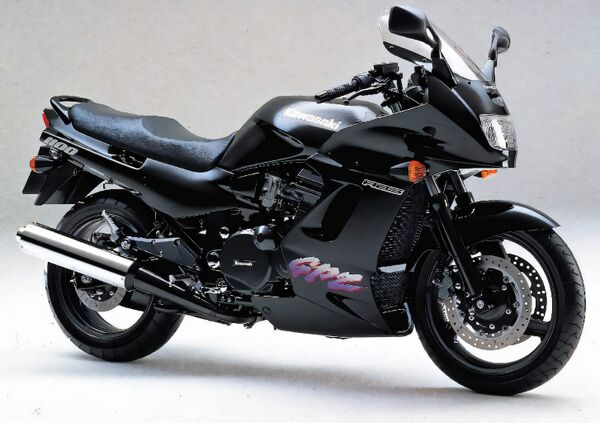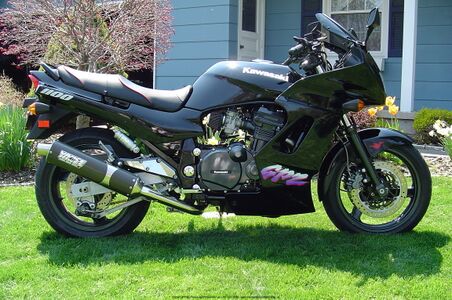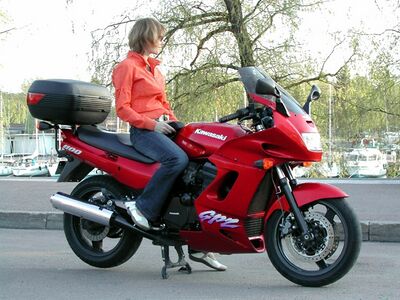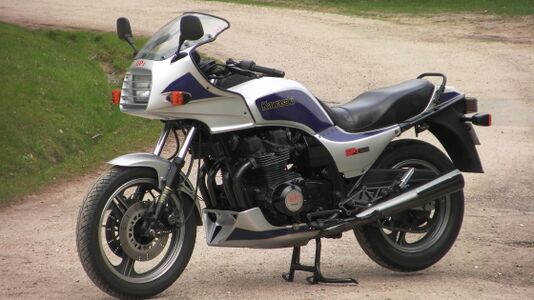Difference between revisions of "Kawasaki GPZ1100"
m |
m (→Photos) |
||
| Line 29: | Line 29: | ||
== Photos == | == Photos == | ||
| − | + | <gallery mode="packed" heights=200px> | |
| − | + | File:Kawasaki-gpz1100-1996-6.jpg| | |
| − | + | File:51886066.kawasakigpz110095bikepics150996.jpg| | |
| − | + | File:GPZ 1100 ZX A2.jpg| | |
| − | + | </gallery> | |
| − | |||
{{Ads_feed}} | {{Ads_feed}} | ||
{{Ads_post}} | {{Ads_post}} | ||
Latest revision as of 13:44, 28 June 2023
Kawasaki GPZ 1100 had two production periods: 1981-1985. - sports bike (factory designation ZX1100); 1995-1998 - sports tourist. Despite the similarity of names, the old and new versions have nothing in common and are completely different motorcycles. In this review, we will analyze both modifications of the Kawasaki GPZ 1100.
Lineup::
- Kawasaki GPZ 400
- Kawasaki GPZ 500
- Kawasaki GPZ 600
- Kawasaki GPZ 750 Turbo
- Kawasaki GPZ 900
- Kawasaki GPZ 1100
Main competitors:
The Kawasaki GPZ 1100 (1981-1985) was a classic 80s sportbike featuring a plastic front fairing, an 18 'front wheel and an inline 4-cylinder engine. However, instead of traditional carburettors, the motorcycle uses digital fuel injection (EFI). The engine was air-cooled, 2 valves per cylinder, and produced 120 hp. power and 100 Nm of torque. The engine was not very revving, and gave out maximum performance at 7000-8750 rpm.
The Kawasaki GPZ 1100 (1995-1998) model is a sports touring motorcycle based on the engine from Kawasaki ZZR 1100. The motor is in-line, 4-cylinder, carburetor, liquid-cooled, with a volume of 1052 cubic meters. see, produces from 97 to 125 hp. power and from 89 to 100 Nm of torque. In the period from 1996 to 1997. versions of the Kawasaki GPZ 1100 with ABS were produced.
The Kawasaki GPZ 1100 engine, with some modifications, was also installed on the classic model Kawasaki ZRX 1100.
Photos
Specifications
| Model | Kawasaki GPZ 1100 (1981-1985) | Kawasaki GPZ 1100 (1995-1998) |
|---|---|---|
| Type of motorcycle | sport | sports tourist |
| Frame | steel | |
| Engine type | 4-cylinder, 4-stroke, in-line | |
| Working volume | 1089 cc cm. | 1052 cc cm. |
| Bore / Stroke | 72.5 x 66 mm | 76.0 x 58.0 mm |
| Compression ratio | 8.9: 1 | 11.0: 1 |
| Cooling | air | liquid |
| Number of valves per cylinder | 2 | 4 |
| Fuel supply system | digital injection (DFI) | Carburetor, 4x 36mm Keihin CVK36 |
| Type of ignition | electronic | transistor (TCI) |
| Maximum power | 120 hp at 8750 rpm | 97 hp (71 kW) @ 8500 rpm - Japanese versions
100 h.p. (74 kW) at 9000 rpm - German versions 125 h.p. (92 kW) - North American versions |
| Maximum torque | 100 Nm @ 7000 rpm | 89 Nm (9.0 kgm) - Japanese and German market versions
100 Nm (11.0 kgm) - North American versions |
| Gearbox | 5-speed | 6-speed |
| Drive type | chain | |
| Front Tire Size | 110/90 V18 | 120 / 70-17 |
| Rear tire size | 130/90 V17 | 170 / 60-17 |
| Front brakes | 2 x 236mm discs, 1-piston calipers | 2 discs 300mm, 2-piston calipers (ZX1100F - ABS) |
| Rear brakes | 1 disc 236 mm, 1-piston caliper | 1 disc 250mm, 1-piston caliper (ZX1100F - ABS) |
| Front suspension | 37mm Kayaba Telescopic Fork, 150mm Travel | 41mm telescopic fork, 120mm travel |
| Rear suspension | monoshock with Uni-Trac progression, stroke - 109 mm | monoshock with Uni-Trac progression, stroke - 125 mm |
| Maximum speed | 240.0 km / h | 254 km / h |
| Gas tank capacity | 20 l | 22 l |
| Weight of motorcycle (dry) | 244 kg | 242 kg |
Documentation



